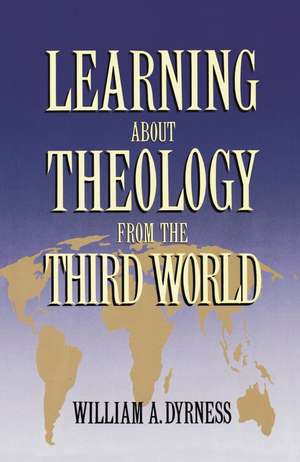Learning about Theology from the Third World
Autor William A. Dyrnessen Limba Engleză Paperback – 27 aug 1990
Preț: 147.60 lei
Nou
Puncte Express: 221
Preț estimativ în valută:
28.26€ • 29.43$ • 23.45£
28.26€ • 29.43$ • 23.45£
Carte disponibilă
Livrare economică 24 ianuarie-07 februarie
Preluare comenzi: 021 569.72.76
Specificații
ISBN-13: 9780310209713
ISBN-10: 0310209714
Pagini: 224
Dimensiuni: 142 x 218 x 16 mm
Greutate: 0.3 kg
Editura: ZONDERVAN
Colecția Zondervan
Locul publicării:Grand Rapids, United States
ISBN-10: 0310209714
Pagini: 224
Dimensiuni: 142 x 218 x 16 mm
Greutate: 0.3 kg
Editura: ZONDERVAN
Colecția Zondervan
Locul publicării:Grand Rapids, United States
Descriere
With the growing awareness of cultural diversity, evangelicals are beginning to realize that "growing up into Christ in all things" (Eph. 4:15) is a corporate enterprise. Due to involvement in mission and international travel, many Westerners are beginning to realize how much they have to learn from different cultural traditions. LEARNING ABOUT THEOLOGY FROM THE THIRD WORLD is designed to introduce western Christians to discussions about theology going on in the Third World. The assumption is that western thinking about theology has not taken third world perspectives into account, and the day has come for us to bring these brothers and sisters into our conversations about Christianity. For the churches in this part of the world are rapidly becoming a significant force in the world and their leaders are becoming increasingly articulate about their faith (and about distortions the feel missionaries have introduced!). It is Dyrness' thesis that if we approach these sometimes unsettling writings as learners rather than teachers, we will find our own perspectives significantly altered. The maturity of the whole church demands this kind of inter-change. After an introductory chapter on the nature and problems of contextualization, the book gives major overviews of the theology of Africa, Latin America, and Asia. Issues are presented in such a way as to show that each area of the world has developed a unique approach to theological issues, and that each perspective has something to contribute to the development of theology. To illustrate this a final chapter discusses Christology form this cross-cultural perspective and the conclusion sketches out ways in which both western and non-western traditions may interact to enrich theology.
